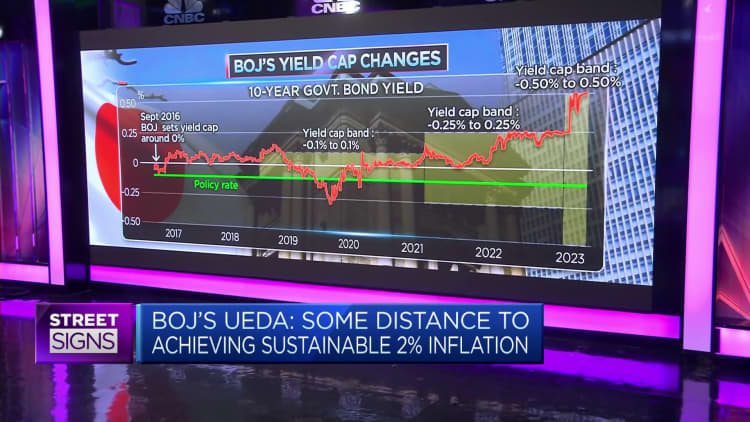Bank of Japan Governor Kazuo Ueda arrives to conduct an interview with a small group of journalists in Tokyo on May 25, 2023.
Richard A. Brooks | AFP | Getty Images
Analysts are split over the Bank of Japan’s moves after the country’s core inflation came in above the central bank’s target of 2% for the 15th straight month.
CLSA Japan strategist Nicholas Smith is of the view that the BOJ has been “wrong-footed” on inflation.
“They watched the Fed say that inflation was transitory, and be made to look fools for doing so,” Smith said in an interview with CNBC’s “Street Signs Asia.”
“They decide to ignore that and continue to forecast this fiscal year, 1.8% inflation. Inflation has been above 2% for 15 months in a row.”
Japan’s core consumer price index climbed 3.3% year-on-year in June, in line with expectations of economists polled by Reuters and slightly higher than the 3.2% recorded in May.

Core inflation in Japan strips out prices of fresh food from the overall consumer price index. Headline inflation rate came in at 3.3% in June, rising slightly from 3.2% seen in May.
The inflation numbers are key to the BOJ’s monetary policy considerations, ahead of its meeting next Friday.
In a note, Barclays economist Tetsufumi Yamakawa said much of the market still appears to view rising prices in Japan as “transitory,” attributing it to a “cost push” instead of a “demand pull.”
However, he sees a “gradually strengthening possibility” that sustained inflation will materialize with the large wage hikes resulting from the latest wage negotiations, or the so-called “shunto.”
“We expect ‘shunto’ wage hikes to be smaller in fiscal year 2024 than in fiscal year 23, but forecast an increase of around +3%, which would be consistent with +2% price stability target,” Yamakawa wrote.
Shift in YCC stance
Given this, investors will be looking for signs that the BOJ will shift its stance on its ultra-loose monetary policy — or more specifically, its “yield curve control” policy.
Under the YCC policy, the central bank targets short-term interest rates at -0.1% and the 10-year government bond yield at 0.5% above or below zero, with the aim of maintaining the inflation target at 2%.
However, BOJ governor Kazuo Ueda signaled in a recent Reuters report the BOJ’s ultra-loose monetary policy could be maintained for now, saying “there was still some distance to sustainably and stably achieving the central bank’s 2% inflation target.”
To Smith, there is “plenty of probability” for the BOJ to shift its stance on YCC at the next central bank meeting next Friday.
According to Smith, the so-called “core-core” inflation rate — which strips out costs of fresh food and energy — is “roaring up” at 4.2% in June. That’s the highest since September 1981, he said adding that “its own measure shows that what they’re saying is wrong.”
The CLSA strategist said the main driver of inflation is food, coupled with electricity price hikes, wage increases and the weak yen. Noting that wages have also seen the largest increase in 30 years this year, Smith said inflation in Japan is likely to surprise to the upside going forward, driven increasingly by a wage price spiral.
“If the BOJ doesn’t do anything, then the yen shoots through 150” against the dollar, he said. “We know from experience that intervention doesn’t work. I’ve seen 95 trillion worth of forex intervention since 1990, and the effect of that has been hours, not days.”
Smith said the BOJ’s bond purchases have been increasing just to maintain the YCC policy, pointing out that its purchases of bonds have amounted to 15.8% of Japan’s gross domestic product since the start of December.
Ueda has said the BOJ is hitting the limit of what it can do because it already owns a third of the bond market, he added. “Now it owns 55% of the bond market and it’s starting to look like Looney Tunes.”
However, Yamakawa doesn’t see the BOJ shifting its stance on monetary policy at the July monetary policy meeting. Instead, he predicted the central bank will launch a phase-out of YCC at its October meeting, when the next quarterly outlook report from is released.


